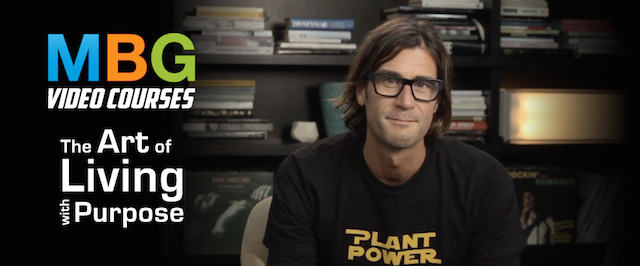Podcast: Play in new window | Download | Embed
Everyone loves a good transformation story.
We like it even better when it’s super dramatic. Preferably framed to appear like it all went down like some kind of overnight miracle. Bonus points for million dollar paydays, instantaneous cures, extreme but effortless weight loss and age reversal.
But that’s just not how this stuff works, people.
Growth and change are hard. And never overnight. It’s a process. 2, 3, 5 even 10 steps backwards for every single step in the right direction. Rinse & repeat, generally in obscurity. It requires dedication, faith, time, toil and pain — because getting out of your comfort zone is just that: uncomfortable. It means taking an honest look in the mirror and objectively evaluating your unpleasantries, missteps and weaknesses. Shedding light on blind spots. And grappling with demons, hardwired patterns and deeply ingrained perspectives on ourselves and our place in the world.
But change is also simple. It begins with a basic a decision to do (or not do) something; anything. A decision generally followed by tiny — sometimes almost imperceptible — changes in behavior made consistently over extended periods of time.
In other words, the trite annoying adage is true. Baby steps do move mountains.
True, sustainable personal growth rarely comes about by changing everything overnight. Instead, it’s about exploring and ultimately developing some level of mastery over just a few small yet important shifts – or even just one aspect of how you spend your time each day. Adopt this approach – a slight shift in perspective and behavior – and you just might be amazed at how impactful this can be on your life experience. How you see, feel about and ultimately interact with yourself, others and the world at large.
Do this — and like today’s guest — you just might find yourself 10% Happier*.
This guy is impressive. Young and ambitious, Dan joined ABC News in 2000 and quickly rose through the ranks under the mentorship of broadcasting legends Peter Jennings and Diane Sawyer. Today he balances duties as co-anchor of ABC News’ Nightline and co-anchor of the weekend edition of Good Morning America on top of filing reports and filling in on air throughout the week on various ABC News programs.
Along the way, Dan has covered some huge stories. He reported on the mass shootings in Newtown, Connecticut, Aurora, Colorado and Tucson, Arizona, and anchored natural disasters from Haiti to Myanmar to Hurricane Katrina. He has also covered combat in Afghanistan, Israel, Gaza and the West Bank, including six visits to war-torn Iraq.
The job is a relentless pressure cooker. The stress mounted, compounded by multiple tours as an embedded journalist in conflict ridden areas of the Middle East. Depression ensued, followed by self-medicating with recreational use of cocaine and ecstasy. Ultimately, these factors conspired to take a serious toll on Dan’s mental and physical health. And it’s here that things get interesting.
In June 2004, it all caught up with Dan (as these things are wont to do), ultimately manifesting in a very public panic attack on national TV – on Good Morning America of all shows — in front of 5 million people.
He wasn’t sure what was wrong with him, only that he knew he had to make some changes. Around this time, in a bizarre stroke of synchronicity, Peter Jennings assigned Dan to start covering stories on faith, religion and spirituality. Ugh. A lifelong nonbeliever, let’s just say Dan was less than thrilled. But what ensued was a bizarre, unexpected adventure into the subculture of mega church pastors, self-help gurus, and brain scientists that eventually led Dan to understand that the source of his problems was the very thing he always thought was his greatest asset: the incessant, insatiable voice in his head. A thinking mind which had both propelled him through the ranks of a hyper-competitive business yet also led him to make the decisions that provoked his on-air freak-out.
We all have that voice in our head. It’s what has us losing our temper unnecessarily, checking our email compulsively, eating when we’re not hungry, and fixating on the past and the future at the expense of the present. Most of us would assume we’re stuck with this voice – that there’s nothing we can do to rein it in – but Dan stumbled upon an effective way to do just that.
A protocol he always assumed to be either impossible or useless:
Meditation.
That’s right people. We’re back to meditation. Do you detect a theme here??
After learning about research that suggests meditation can do everything from lower your blood pressure to essentially rewire your brain, Dan took a leap of faith. A deep dive into the underreported world of CEOs, scientists, and even prison guards and marines who are now using it for increased calm, focus, and happiness.
Dan’s a great guy and it was super fun to sit down with him in his NYC Nightline office the other week to hear all about this adventure. An adventure he chronicles in his highly entertaining and illuminating memoir called – you guessed it – 10% Happier: How I Tamed the Voice in My Head, Reduced Stress Without Losing My Edge, and Found Self-Help That Actually Works–A True Story*.
It’s a fun book that delves into the inner workings of national network news as Dan recounts how he stopped using drugs (always a favorite topic of mine), discovered the benefits of meditation (again, a recurrent theme of this show), and resolved the apparent conflict between meditation-induced equanimity and the aggressive competitiveness required for success as a TV-news journalist (something I continue to struggle with).
For a quick primer on what’s in store prior to tuning in to the conversation, check him out on The Colbert Report, then treat yourself to this highly entertaining 15 minute talk Dan gave at the recent MindBodyGreen Revitalize Summit:
Let’s step into the world of Dan Harris.
I sincerely hope you enjoy the conversation.
Peace + Plants,

SHOW NOTES
Connect With Dan Harris: Facebook | Twitter | Instagram
- 10% Happier: How I Tamed The Voice in My Head, Reduced Stress Without Losing My Edge, and Found Self-Help That Actually Works — A True Story* by Dan Harris
- Huffington Post: Dan Harris Re-Watches His On Air Panic Attack
*Disclosure: Books and products denoted with an asterisk are hyperlinked to an affiliate program. We are a participant in the Amazon Services LLC Associates Program, an affiliate advertising program designed to provide a means for us to earn fees by linking to Amazon.com and affiliated sites.
HOW CAN I SUPPORT THE PODCAST?
1. TELL A FRIEND! (Self-explanatory)
2. SHARE ONLINE! (Also self-explanatory)
3. SUBSCRIBE & REVIEW the show on iTunes, Stitcher and Soundcloud and TuneIn.
4. DONATE: Check out the DONATE button on the right hand margin or click HERE to learn more. We even accept Bitcoin!
5. DOWNLOAD THE NEW MOBILE APP! Now you can access, stream, download and share the entire RRP catalog in the palm of your hand on any iOS mobile device (iPhone, iPad and iPod Touch) with our new mobile app. Never miss an episode, plus special announcements, discounts, giveaways. Already downloaded? Awesome. When you have a minute, and it feels right to you, do us a solid and give the app a review in the iTunes Store.
Thanks for listening and thanks for the support!



“Daily collision with the asshole in your head” sums it up perfectly.
As a type “A” dude who is new to mediation, Dan speaks my language.
great interview. Thank you Rich.
I really enjoyed this interview. I like that Mr. Harris is agnostic and that he approaches meditation from a scientific view. I started watching the Good Morning America Weekend version a couple years ago. I had no idea about Mr. Harris’s struggles with drugs and depression. I also wasn’t aware that he had a book out. I will be getting his book soon.
One question that has been on my mind is if the ecstasy he was taking could have open his mind up to meditation. From the interview I inferred that he never really thought there was anything to meditation and it wasn’t until after he had used ecstasy that he was open to meditation.
I also think science can explain the two or many voices in our head, especially the monkey mind. Our brain is actually three brains, or at least has three main regions. We have the hind brain (reptilian brain), the midbrain (mammaliian brain), and the forebrain (neocortex). There is also 4 lobes and 2 hemispheres. There is also our digestive system that acts as a brain and all those critters that live in our colon are sending messages all the time.
Thanks for interviewing Mr. Harris. I think it will do a lot to help people understand how simple, easy, and powerful meditation is.
regards,
Brian K. Beaven
This guy was taking coke? I can’t imagine that because he seems pretty hyper and talks a mile a minute! Phew.
I loved this one. Meditation is really turning off the brain but is all tied up with spirituality, religion and various bizarre rituals and poses which turns people off for various reasons. It’s as easy or insanely difficult as just sitting there trying to focus on the breath. Eckhart Tolle has an amazing ability to put things in simple easy to understand terms and I think he purposely didn’t give a ‘how to’ other than to say just observe the dysfunctional mind from the outside, ie the solution isn’t within the thinking mind. But I find it’s been impossible so far as it is a learned skill that I haven’t worked hard enough on. I read the books and understand the concepts intellectually. I love how Dan said it was hard but you keep trying to focus on the breath. But as far as who is doing the listening etc I think it’s somewhat of a feedback loop (like when you talk and you hear yourself) and not some separate entity of some kind.
Thank you for the great and inspirational interview! As always 🙂
What was the second author Dan was reading after reading Eckhart Tolle?
Thanks!
Julia
I’ve read his book (actually listened to his audiobook, which was fantastically read by him) and listened to him on a few other podcasts. As usual, your interview of him takes on a much deeper meaning and you have such a great knack for asking the right questions. Learned more about him and his journey by listening. Thank you.
Thanks for this episode. Dan had the best description of what meditation does that I have heard. I immediately got his book afterwards.
Also, thanks for the podcast notes. I find them very useful.